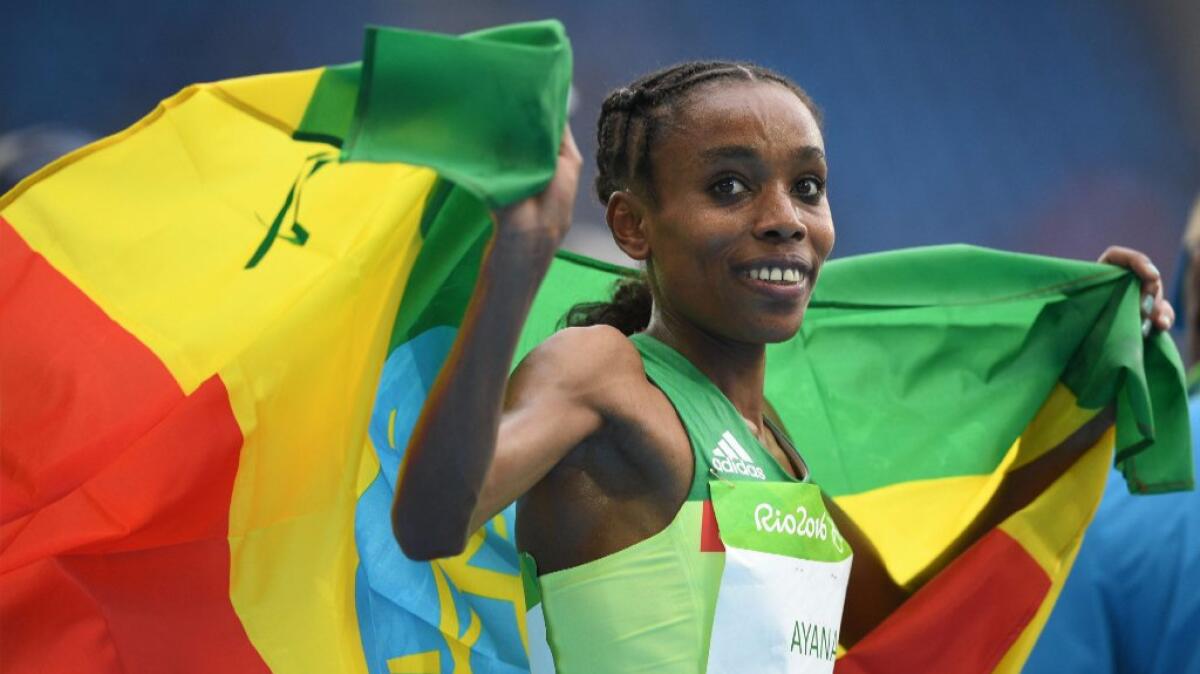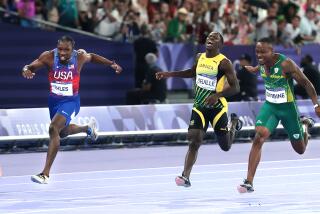Time, testing and track: the scenarios that will define athletics in the Olympic Games

Reporting from Rio de Janeiro — Whether cynical or a reflection of doping’s deep incursion into track and field, it’s now customary to view exceptional performances with a dollop of skepticism. So it wasn’t surprising when Almaz Ayana of Ethiopia faced doping questions Friday, after she shattered the world record in the women’s 10,000 by more than 14 seconds at Olympic Stadium to win the first track and field gold medal of the Rio Games.
Swedish runner Sarah Lahti told Swedish media she didn’t believe Ayana “is 100 percent. It is too easy for her,” and Ayana was asked for her response. She replied through an interpreter. “I did my training. I praise the Lord,” said Ayana, whose time of 29 minutes, 17.45 seconds erased the mark set by China’s Wang Junxia in 1993. “My doping is my training. My doping is Jesus. Otherwise nothing. I am crystal clear.”
Time and testing will reveal the truth, but doping likely will be on ongoing issue during the track and field competition.
The International Assn. of Athletics Federations — the sport’s governing body — banned Russian athletes from competing here following a World Anti-Doping Agency investigation that found evidence of widespread, state-sponsored doping. The only Russian allowed to participate is long jumper Darya Klishina, who will compete as a “neutral” athlete. Russians won 16 track and field medals at London in 2012. In addition, more than a dozen Kenyan athletes have been suspended for doping, and a sprint coach was sent home Thursday after allegedly posing as an 800-meter runner to facilitate cheating on a drug test.
Ayana’s victory Friday was stunning. She broke away with about 12 laps to go, leaving behind Vivian Cheruiyot of Kenya (29:32.53) and two-time Olympic champion Tirunesh Dibaba of Ethiopia (29:42.56). Molly Huddle of Providence, R.I., set an American record of 30:13.17, which was faster than Dibaba’s winning time in 2012 but sixth here. “I’m happy with the time,” Huddle said. “The American record is a very good record. I’m proud to have that. I said 30:20 is what I hoped for and I ran faster than that and didn’t get a medal, but I felt I did more or less all I could do.”
Emily Infeld of Cleveland ran a personal-best 31:26.94 to finish 11th, and Marielle Hall of Haddonfield, N.J., was 33rd (32:39.32).
The shadow cast by doping was pierced Friday night by the joy of American shot putter Michelle Carter after she defeated two-time Olympic champion Valerie Adams of New Zealand on her last throw. Carter, a four-time Olympian and first-time medalist, set an American record of 20.63 meters (67 feet, 8¼ inches) in winning the first U.S. women’s shot put medal since Earlene Brown’s bronze in 1960. Adams won silver at 20.42 meters (67 feet).
“To have all of those pieces finally come together that you’ve been working on, it all just comes together for that one moment, it’s a great feeling,” said Carter, who is coached by her father, Michael, who followed his 1984 Olympic shot put silver medal with a Super Bowl title with the San Francisco 49ers. “I knew it was a good throw but didn’t know how far it could be.”
Michael Carter didn’t mind being one-upped by his daughter. “Winning a gold medal means you’re the best in the world at that time,” he said. “With the Super Bowl you have a chance to win it every year. This only comes around once every four years or once in a lifetime. I’m numb right now.”
There were few surprises in the day’s other events.
Kirani James, the 2012 gold medalist in the men’s 400, had the fastest qualifying time, 44.93 seconds. London bronze medalist Lalonde Gordon of Trinidad and Tobago also advanced to the semifinals, as did U.S. Olympic trials champion LaShawn Merritt, who jogged to the line in 45.28 to win his heat. “The plan is to just take it a race at a time and get to that final and lay it all out in the final,” said Merritt, whose time of 43.97 seconds at the trials is the fastest in the world this year. Americans Gil Roberts (45.27) and David Verburg (45.48) also advanced.
All three U.S. women got out of the first round of the 1,500, led by Shannon Rowbury’s 4:06.47 and Jenny Simpson’s 4:06.90. “It was kind of cat-and-mouse out there,” said Brenda Martinez of Rancho Cucamonga, who was timed in 4:11.74.
Long jumpers Jeff Henderson (8.20 meters, 26 feet, 11 inches) and Jarrion Lawson (7.99, 26-2 ¾) advanced to the final but Mike Hartfield couldn’t crack the top 12. Charles Jock of San Diego and UC Irvine was eliminated in the first round of the men’s 800 but Boris Berian (1:45.87) and Clayton Murphy (1:46.18) moved on. Olympic and world champion David Rudisha of Kenya had the top time, 1:45.09.
Jessica Ennis-Hill of Britain, the defending Olympic and world heptathlon champion, led after four events with 4,057 points. Barbara Nwaba of Santa Barbara was 11th.
Two-time 100-meter champion Shelly-Ann Fraser-Pryce of Jamaica, trying to become the first woman to win three straight titles in her event, had the top first-round time, 10.96 seconds. Americans English Gardner (11.09), Tori Bowie (11.13) and Tianna Bartoletta (11.23) also advanced to Saturday’s semifinal.
Also worth looking forward to Saturday: the first appearance of Jamaica’s Usain Bolt, who’s pursuing his third straight sweep of titles in the 100 and 200 and the 400-meter relay. His first race is the 100 meters.
Follow Helene Elliott on Twitter @helenenothelen
More to Read
Go beyond the scoreboard
Get the latest on L.A.'s teams in the daily Sports Report newsletter.
You may occasionally receive promotional content from the Los Angeles Times.







